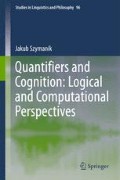Abstract
This chapter is a crash course in generalized quantifier theory, which is one of the basic tools of today’s linguistics. In its simplest form generalized quantifier theory assigns meanings to statements by defining the semantics of the quantifiers, like ‘some’, ‘at least 7’, and ‘most’. I introduce two equivalent definitions of generalized quantifier: as a relation between subsets of universe and as a class of appropriate models. I discuss the notion of logic enriched by generalized quantifiers and introduce basic undefinability results and the related proof technique based on model-theoretic games. Then, I discuss a linguistic question: which of the logically possible quantifiers are actually realized in natural language. In order to provide an answer, I introduce various linguistic properties of quantifiers, including the key semantic notion of monotonicity.
Access this chapter
Tax calculation will be finalised at checkout
Purchases are for personal use only
Notes
- 1.
See, e.g., Hodges (1997) for a textbook exposition of model theory. Also consult the Appendix for a quick introduction.
- 2.
We will sometimes write \(R_i^M\) for relations to differentiate them from the corresponding predicates \(R_i\).
- 3.
For more undefinability results and an introduction to Ehrenfeucht-Fraïssé techniques, we suggest consulting, e.g., Chap. 4 in Peters and Westerståhl (2006). A reader interested in game-theoretic approaches to various extensions of first-order logic is encouraged to reach for the book by Väänänen (2011).
- 4.
Below we assume that a logic \(\mathcal {L}\) has the so-called substitution property, i.e., that the logic \(\mathcal {L}\) is closed under substituting predicates by formulas.
- 5.
However, it is actually conservative in the second argument.
- 6.
References
Barwise, J., & Cooper, R. (1981). Generalized quantifiers and natural language. Linguistics and Philosophy, 4, 159–219.
van Benthem, J. (1986). Essays in Logical Semantics. Reidel.
Frege, G. (1879). Begriffsschrift: Eine Der Arithmetischen Nachgebildete Formelsprache Des Reinen Denkens. Halle.
Geurts, B. (2003). Reasoning with quantifiers. Cognition, 86(3), 223–251.
Geurts, B., & van der Slik, F. (2005). Monotonicity and processing load. Journal of Semantics, 22, 97–117.
Gierasimczuk, N. (2009). Identification through inductive verification. Application to monotone quantifiers. In P. Bosch, D. Gabelaia, & J. Lang (Eds.), Logic Language, and Computation, 7th International Tbilisi Symposium on Logic, TbiLLC 2007. Lecture Notes on Artificial Intelligence (Vol. 5422, pp. 193–205). Tbilisi: Springer.
Gierasimczuk, N., & Szymanik, J. (2011). Invariance properties of quantifiers and multiagent information exchange. In M. Kanazawa, A. Kornai, M. Kracht, & H. Seki (Eds.), Proceedings of 12th Meeting on Mathematics of Language. Lecture Notes in Computer Science (Vol. 6878, pp. 72–89). Berlin: Springer.
Hodges, W. (1997). A Shorter Model Theory. New York: Cambridge University Press.
Hunter, T., & Lidz, J. (2013). Conservativity and learnability of determiners. Journal of Semantics, 30(3), 315–334.
Icard III, T., Moss, L. (2014). Recent progress in monotonicity. Linguistic Issues in Language Technology, 9.
Johnson-Laird, P. N. (1983). Mental Models: Toward a Cognitive Science of Language, Inference and Consciousness. Harvard University Press.
Ladusaw, W. (1979). Polarity Sensitivity as Inherent Scope Relations. Ph.D. Thesis. University of Texas.
Lindström, P. (1966). First order predicate logic with generalized quantifiers. Theoria, 32, 186–195.
Montague, R. (1970). Pragmatics and intensional logic. Dialectica, 24(4), 277–302.
Mostowski, A. (1957). On a generalization of quantifiers. Fundamenta Mathematicae, 44, 12–36.
Peters, S., & Westerståhl, D. (2006). Quantifiers in Language and Logic. Oxford: Clarendon Press.
Tiede, H.-J. (1999). Identifiability in the limit of context-free generalized quantifiers. Journal of Language and Computation, 1, 93–102.
Väänänen, J. (2011). Models and Games. Cambridge University Press.
Väänänen, J., & Westerståhl, D. (2002). On the expressive power of monotone natural language quantifiers over finite models. Journal of Philosophical Logic, 31, 327–358.
Author information
Authors and Affiliations
Corresponding author
Rights and permissions
Copyright information
© 2016 Springer International Publishing Switzerland
About this chapter
Cite this chapter
Szymanik, J. (2016). Basic Generalized Quantifier Theory. In: Quantifiers and Cognition: Logical and Computational Perspectives. Studies in Linguistics and Philosophy, vol 96. Springer, Cham. https://doi.org/10.1007/978-3-319-28749-2_3
Download citation
DOI: https://doi.org/10.1007/978-3-319-28749-2_3
Published:
Publisher Name: Springer, Cham
Print ISBN: 978-3-319-28747-8
Online ISBN: 978-3-319-28749-2
eBook Packages: Social SciencesSocial Sciences (R0)

